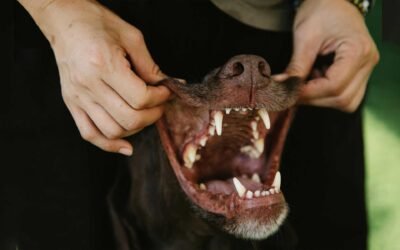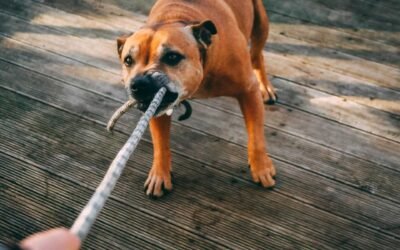Leaky Gut Syndrome (LGS) is a condition in which the intestinal walls become damaged, becoming more permeable than usual, allowing harmful substances like bacteria, toxins, allergens, and undigested food particles into your pets’ bloodstream. In veterinary terms, this condition is known as Intestinal Hyperpermeability and can lead to a range of health issues in pets. It is essential for pet parents to understand the triggers that cause a leaky gut, its symptoms, and treatment options so that we can provide the best care for our little ones.
What causes leaky gut syndrome?
Unfortunately, in the present day our pets are exposed to many lifestyle factors and varied diets, all of which upset their gastrointestinal health, leading to the development of a leaky gut. Key examples are as follows:
Medications- Antibiotics wipe out the good bacteria in the gut, causing dysbiosis and weakening the intestinal barrier. Prolonged use of medications on our furry companions like steroids, antihistamines, and flea and tick medicines disrupt their gut microbiome, making the gut lining more permeable.
Vaccination – Over- vaccination compromises our pet’s immune system and upsets the delicate balance of bacteria in the gut, essentially damaging the microbiota.
Dietary protein – Lectins are proteins present in plants like beans, peas, soybeans, lentils, other legumes, peppers, potatoes and tomatoes. If our little one’s diet includes the above proteins, the lectin in the diet attacks the lining of their gut, causing inflammation and leading to a leaky gut. As lectin is present in almost all grains, monitoring our pet’s diet is essential.
Dairy product – Whey and casein, proteins found in milk, have the potential to trigger inflammation in our fur buddies’ gut. Casein intolerance could lead to a leaky gut. Casein found in Goat milk is different as compared to cow’s milk and hence it makes it easier for our fur baby to digest it.
Stress – Just like in humans, stress is a major contributor to gut inflammation in our pets. Stress can have a significant impact on their digestive health, leading to inflammation of the gut and increasing intestinal permeability, which in turn affects multiple organs.
Environmental factors – Environmental pollution, heavy metal toxicity through soil, drinking water, and pesticides found in fruits and vegetables can alter the composition of our pet’s gut microbiome. This increases the risk of developing leaky gut syndrome in our little ones.

Photo by Cintya Marisa on Unsplash
Symptoms of Leaky Gut Syndrome
The leaky gut syndrome often overlaps with other health issues in pets; hence it becomes difficult to identify. Here are a few common signs to watch out for.
Irritable Bowel Syndrome (IBS)- If our pet has frequent digestive disorders like diarrhoea, increased or worse smelling flatulence, abdominal pain, bloating, blood or mucous in the stool and constipation then leaky gut syndrome may be to blame.
Food Allergies – Food sensitivities or allergies may develop in pets as a result of undigested food particles leaked into the bloodstream.
Skin disease – If our furry companions develop chronic skin problems like itching, rashes and hot spots, then poor gut health is to blame.
Behaviour issues – If our pets show behavioural changes such as irritability, aggression or anxiety, one of the possibilities for such behaviour could be compromised gut health.
Obsessive- Compulsive Disorder (OCD)- One expression of Leaky Gut Syndrome can be Obsessive-Compulsive Disorder (OCD) in pets. Signs of OCD in pets include behaviours like excessive spinning, pacing, staring, tail chasing, air biting, self-mutilation, and pica.
Weight loss – If our furry buddy is losing weight or showing poor weight gain, despite a healthy appetite, then it is a matter of concern. This could indicate a compromised gut barrier integrity.
Chronic Fatigue – The longer a pet suffers from leaky gut syndrome, fatigue becomes unavoidable, as our pet’s body is constantly under attack.
Joint Issues – The inflammation in the entire body which our pet will experience as a result of a leaky gut, will make the symptoms of arthritis and joint disease worse. Pet parents should be vigilant and monitor their pets so that they can consult a veterinarian to manage the issue.
How to treat a leaky gut?
Treating a leaky gut involves multiple approaches, with a focus on restoring gut health and reducing inflammation. Here are a few pointers for the same:
Biologically appropriate diet – It would be ideal to transition our little ones to Biologically appropriate diet and keep away from processed food. Feed high-quality protein made from responsibly sourced ingredients and is 100% natural. Eliminate low-quality treats filled with excessive sugars, fillers, additives and preservatives.
Avoid dairy products – Avoiding dairy products, instead adding yoghurt or kefir, made from goat’s milk, to our fur babies’ diet would help.
Home remedies for deworming – Rather than using pet dewormers brought off the shelf, which are full of toxic chemicals, opt for a natural solution. Here are a few tips from Alfie & Claire.
Crushing raw organic pumpkin seeds and giving ¼ teaspoon per 10 lbs of body weight once or twice daily until the parasites are gone.
Mixing ½ to 1 tsp black cumin seeds daily in their food.
Adding ¼ to 1 tsp raw organic apple cider vinegar daily in our pet’s water or food.
Reduce Stress – Stress affects the gut and makes the gut lining more permeable. There are numerous ways to keep our little ones’ calm during stressful situations- using calming music, using thunder shirts or wraps during thunderstorms, providing a safe and quiet place during noisy festivals, massaging them if they find it relaxing, or use calming herbs like Ashwagandha, turmeric or ginger.
Fight inflammation naturally – It would be better to incorporate natural approaches in our pet’s routine to reduce inflammation and support gut health. Providing a high-quality, balanced diet rich in anti-inflammatory foods such as fatty fish (e.g., salmon), leafy greens, blueberries, ginger, pumpkin, carrots and turmeric. Avoiding processed foods and ingredients that may trigger inflammation.
Add Prebiotics and Probiotics – Probiotics are the good bacteria that play a vital role in maintaining the gut microbiota. These beneficial bacteria are living entities that need to eat. Prebiotics are food for the probiotics, they are insoluble fibers that nourish the probiotic, making them more effective. A few natural prebiotics to give our little one would be cooked mushrooms (raw mushrooms are indigestible and can be toxic), chicory root, burdock root and raw fresh crushed garlic. Whole heads of garlic can be toxic to our pet, feeding the right amount is excellent. Feeding guidelines as below.
10 to 15 pounds – 1/2 clove
20 to 40 pounds – 1 clove
45 to 70 pounds – 2 cloves
75+ pounds – 2 1/2 cloves
Besides adding food with natural probiotics like green tripe, kefir or yogurt made with goat’s milk to our furry companions diet; a daily probiotic powder supplement also helps. While selecting the brand please ensure the brand guarantees the quantity of colony-forming units (CFU), which is a metric used to quantify the number of bacterial cells present in a probiotic supplement.
Supplement with Bone broth – Bone Broth is the go-to supplement for pet parents seeking to enhance their pet’s gut health. It not only supports the immune system, it also contains gelatin, which is derived from collagen found in bones and connective tissue. Gelatin is rich in amino acids like glutamine, glycine, and proline, which are considered beneficial for the integrity of our pets gut lining.
Stop all medications – Stop medications (including excessive vaccination and antibiotics), and approach a holistic vet, who would take a more natural approach to medicine. Titer testing instead of over-vaccinating is also an option to be considered.
Conclusion
As loving pet parents, witnessing our fur babies fall ill is distressing. Fortunately, Leaky gut syndrome can be avoided to a great extent with proper care. Pet Parents should always consider feeding nutritious, healthy, wholesome and natural meals. Alfie & Claire is a strong advocate for and is committed to feeding 100% natural and well balanced meals to our pets.



0 Comments